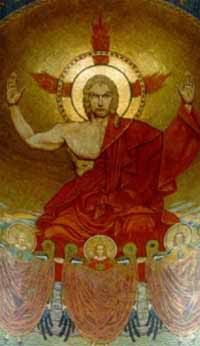Pope helps define inclusiveness

The argument from all the Catholic dissidents is that Jesus accepts everyone.
Which is true.
But the uncomfortable fact is the Jesus then asks
the sinner to stop sinning and follow Him. Which is also true.
The
Pope nicely exposes the half-truth of the dissident argument in his talk about
Matthew.
Link
Basing ourselves on these simple observations that arise from the Gospel, we can make a couple of reflections. The first is that Jesus welcomes in the group of his close friends a man who, according to the conception of that time in Israel, was regarded as a public sinner.
Matthew, in fact, not only managed money, considered impure as it came from people foreign to the people of God, but in addition collaborated with a foreign authority, odiously avid, whose tributes could be determined arbitrarily.
For these reasons, on more than one occasion, the Gospels mention together "publicans and sinners" (Matthew 9:10; Luke 15:1), "publicans and prostitutes" (Matthew 21:31). Moreover, they see in publicans an example of avarice (cf. Matthew 5:46: they only love those who love them) and mention one of them, Zacchaeus, as "chief tax collector, and rich" (Luke 18:11).
Given these references, there is a fact that calls attention: Jesus excludes no one from his friendship. More than that, precisely when he is seated at the table in Matthew-Levi's house, answering those who were scandalized by the fact of his frequenting rather undesirable company, he makes the important declaration: "Those who are well have no need of a physician, but those who are sick; I came not to call the righteous but sinners" (Mark 2:17).
The good proclamation of the Gospel consists precisely in this, in the offering of God's grace to the sinner! In another passage, with the famous parable of the Pharisee and the publican who went up to the Temple to pray, Jesus even points to an anonymous publican as example of humble confidence in divine mercy: While the Pharisee boasted of moral perfection, "the tax collector, standing far off, would not even lift up his eyes to heaven, but beat his breast, saying, 'God, be merciful to me a sinner!'"
And Jesus commented: "I tell you, this man went down to his house justified rather than the other; for every one who exalts himself will be humbled, but he who humbles himself will be exalted" (Luke 18:13-14).
With the figure of Matthew, therefore, the Gospels present us an authentic paradox: He who seems to be farthest from holiness might well become a model of acceptance of God's mercy enabling one to glimpse its marvelous effects in his life.
In this connection, St. John Chrysostom makes a significant comment: He observes that only in the narration of some of the calls is the work mentioned in which those in question were engaged. Peter, Andrew, James and John were called while they were fishing; Matthew while he collected taxes.
They are jobs of little importance, comments Chrysostom: "As there is nothing that is more detestable than the tax collector and nothing more ordinary than fishing" ("In Matth. Hom": PL 57, 363).
The call of Jesus comes, therefore, also to people of a low social level, while they are engaged in their ordinary work.
There is another reflection that arises from the Gospel narrative: Matthew responds immediately to Jesus' call: "He rose and followed him." The conciseness of the phrase underlines clearly Matthew's promptness in response to the call.
This meant for him abandoning everything, especially a sure source of income, though often unjust and dishonorable. Obviously Matthew understood that familiarity with Jesus did not allow him to continue with activities disapproved by God.
One can easily intuit that it can also be applied to the present: Today one cannot admit attachment to what is incompatible with the following of Jesus, as are dishonest riches. Once he said openly: "If you would be perfect, go, sell what you possess and give to the poor, and you will have treasure in heaven; and come, follow me" (Matthew 19:21).
This is precisely what Matthew did: He rose and followed him! In this "rising" one can see the detachment from a situation of sin and, at the same time, the conscious adherence to a new life, upright, in communion with Jesus.




0 Comments:
Post a Comment
<< Home